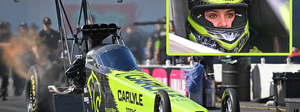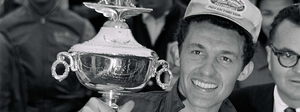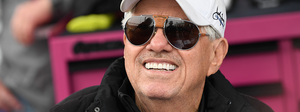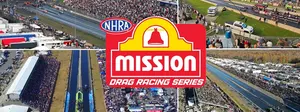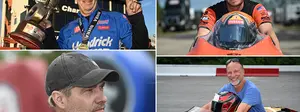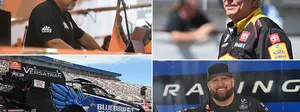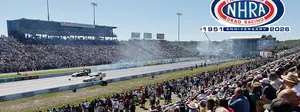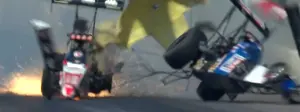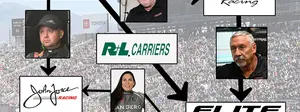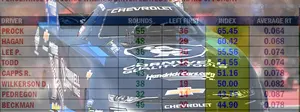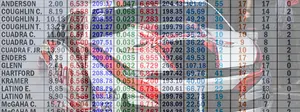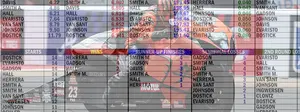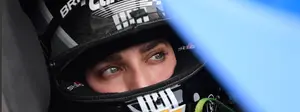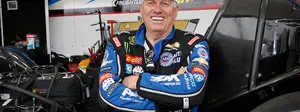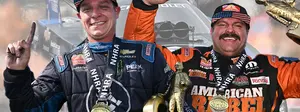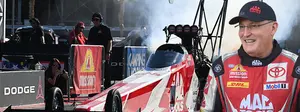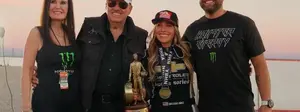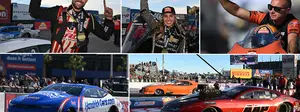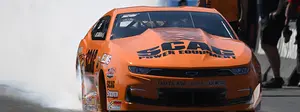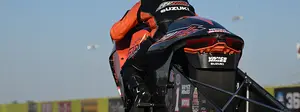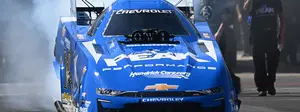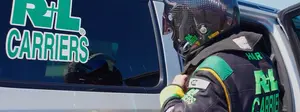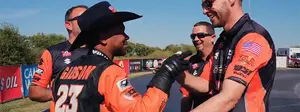How Antron Brown became one of NHRA's biggest and brightest stars
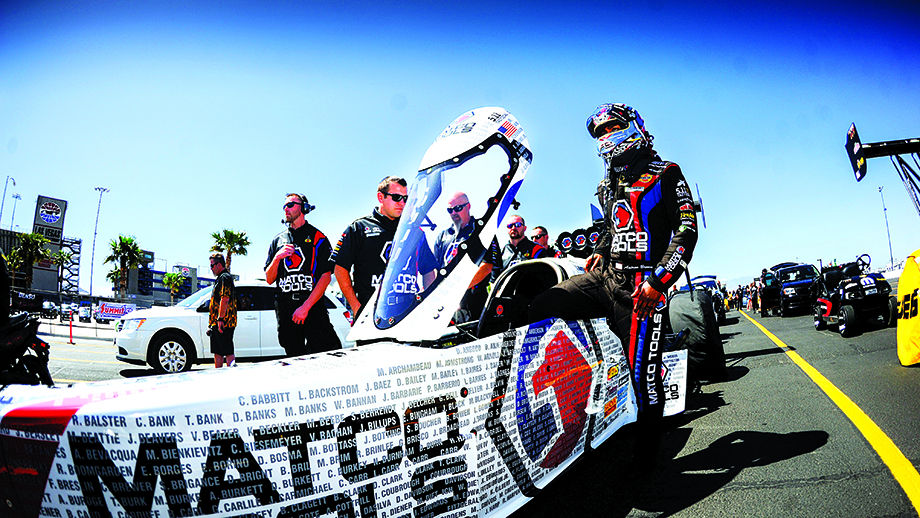
Antron Brown stands today as one of NHRA Drag Racing’s biggest and brightest stars. The three-time Top Fuel world champion exudes energy, charisma, excitement, and a positive vibe that makes it hard to not smile or be uplifted in his presence.
But 20 years ago, Brown stood at the crossroads of a drag racing career. If he turned left, maybe he could go back to school and build on the business degree he’d already earned; he always dreamed of owning his own company. If he turned right, maybe he could parlay the athletic prowess that had made him a three-sport star in high school into living in the sports world and still enjoy bracket racing his motorcycle to satisfy his need for speed.
Or he could continue down the path he’d started two years earlier when he’d accepted the chance to ride a Pro Stock Motorcycle for his cousin’s husband, NFL cornerback Troy Vincent. The problem that faced Brown in 2000, however, was that even though he and Vincent had enjoyed success with three national event wins and a third-place finish in 1999, Vincent was pulling out of funding the Team 23 Suzuki.
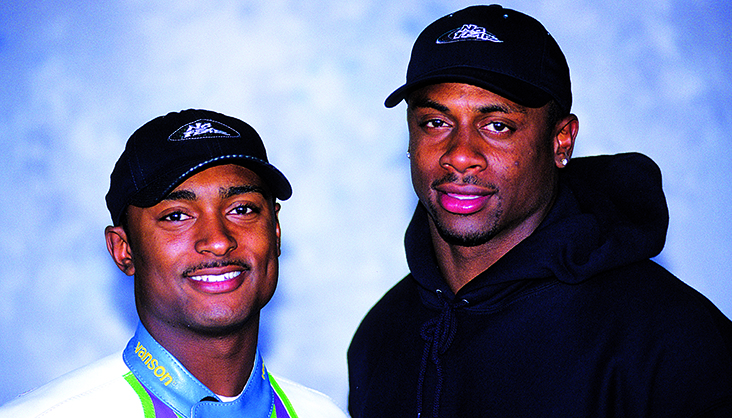
“I raced with Troy for two years, but then he had to focus on his football career, because he was getting close to retiring,” Brown recalled. “He told me it was time for me to sink or swim, to either become a team owner or let it all go. Basically, he threw me to the wolves. It may have been the best thing that ever happened to me.”
Looking back 20 years ago, there are many things that Brown didn’t have then that he does now. A wife. Kids. Um, a place to live.
“I was 23 years old. I was single, and the only thing I owned was a ’98 Ford Mustang,” he recalls, rolling his eyes and laughing at the distant memory of himself. “I didn’t even have an apartment — I actually lived in my race shop in Indy — and was driving back and forth to Louisiana to visit my girlfriend Billie Jo, who’s now my wife. It was crazy.”
One thing he did have was the desire to see what his drag racing future held.
“Getting to drive a Pro Stock Motorcycle was a dream, but it was also about being able to do it well, to keep a sponsor, to run it as a business,” he theorized. “You have to learn how to do the business side of it, speak to sponsors, and have all of those obligations. It’s a craft.
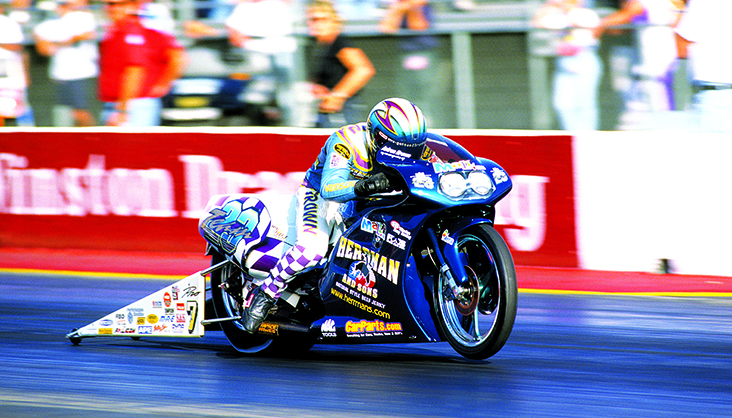
“When I first started riding for Troy, there were no worries in the world, no expectations. We were new and fresh and green and just happy to be there. To win was a bonus. We certainly weren’t expecting it. In 1998, we didn’t have the power, so if we won any rounds, it was on holeshots. In 1999, we got on the Vance & Hines program and had the power to outrun people, too.”
Vincent had already changed Brown’s life once, calling him practically from out of the blue in late 1997 while Brown was still attending New Jersey’s Mercer Junior College, pursuing his Associate of Arts degree in business administration.
“He actually talked to my parents first before calling me,” Brown recalled with a laugh. “It was a crucial point for me because I was just finishing up my two years at Mercer and had already committed to [Long Island University] to get my bachelor’s. When he called and asked if I was interested, I told him ‘Without a doubt.’ I had never driven a big-tire bike, but I knew I could do it; that was my wheelhouse. I was ready for it, and that was what I wanted.”
Drag racing and motorcycles certainly were nothing new to Brown, who grew up attending races in New Jersey with his father, Albert, and uncle, Andre, who bracket raced at Garden State strips after the need for speed was passed down to them by their father.
Brown had been riding motorcycles almost his whole life, learning to ride one not long after mastering the training wheels of a pedal bicycle, and by age 12, he was competing in motocross events.
A gifted athlete, Brown also starred in football, basketball, and track and field at Northern Burlington County Regional High School in Columbus, N.J., and went drag racing for the first time during his senior year, riding a nine-second, 160-mph Suzuki GSXR 1100.
Speed came easy to him, on wheels or feet. In college, he honed his track and field skills and ran quick enough in the 100-meter dash to receive an invitation to the 1998 U.S. Olympic Trials and was even offered an athletic scholarship by LIU, but he chose drag racing.
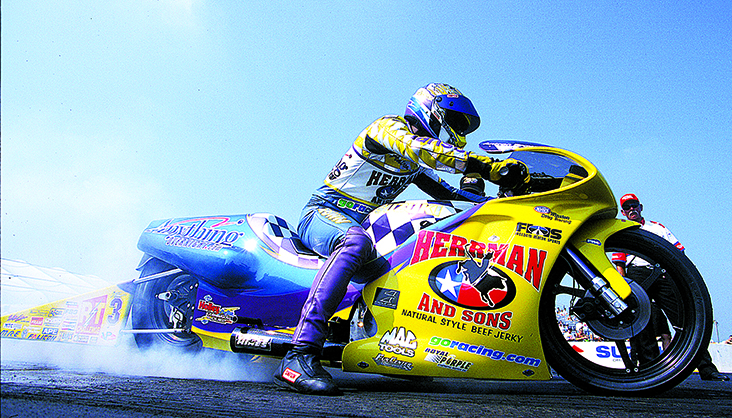
“Once I started on that drag racing path, I wasn’t going to quit,” he said. “I just had to buckle down and make it happen. There was no way I was going any other way.”
Brown and crew chief Mark Peiser struck out on their own in 2000 in a shop they rented from Meredith Schultz after her husband, Pro Stock Motorcycle hall of fame rider Dave Schultz, had passed away from cancer.
They put together a couple of sponsorships — Herrman and Sons Beef Jerky and AnythingOvernight.com and later Mac Tools — and went racing, scoring three wins in both the 2000 and 2001 seasons, including a win in Indy in 2000, where they also won the champion Holley Dominator Duel.
“We were just trying to find our way,” he remembered. “We’d look each other in the eyes and say, ‘We can do this.’ There were times we didn’t even know how we were going to get from race to race. I would get on the phone and squeak together money here and there to make it happen. People talk about living paycheck to paycheck; we were living day to day.”
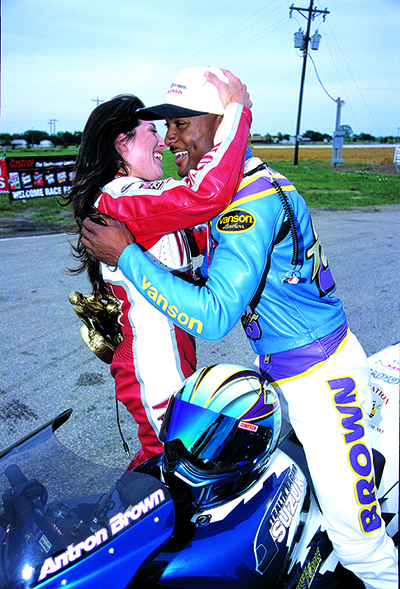
While Brown and Peiser were contemplating their future at the end of the 2001 season, so was Brown’s longtime friend and fellow rider Angelle Sampey, who just happens to be Billie Jo’s cousin. Despite winning the championship, Sampey had just been released from her longtime ride with Star Racing, so she and Brown, who had finished second behind her in points, decided to join forces with her riding a second team bike. The plan was to race until midseason 2002 with the hopes of stirring up interest.
They headed to Pomona for the Winternationals, even though the class was not competing there, to network for sponsorships, and a chance encounter changed both of their lives.
The duo had previously approached Don Schumacher about adding their bikes to his mega team, but it didn’t really come to fruition until they ran into Lt. Gen. Dennis D. Cavin, who was the U.S. Army’s liaison with Don Schumacher Racing for the sponsorship of Tony Schumacher’s Top Fueler, leaving the hotel one morning.
Once they explained their goals to Cavin, who saw the benefits of having two motivational spokespersons with the diversity that the duo offered, the wheels were in motion, and later that season, they joined the DSR team riding Army-backed Suzukis in what Brown considers a breakthrough accomplishment for the Pro Stock Motorcycle class.
Brown rode the Army Suzuki through the end of the 2007 season but scattered just five wins over those five seasons before switching to Top Fuel in 2008 and, ultimately, reuniting with Schumacher a few years later.
Brown has parlayed these breaks into a hall of fame career that now includes not just three Top Fuel championships with Don Schumacher Racing but 66 national event wins, an even 50 of which have come since he switched from two wheels to four in 2008.
No one dreams that big.
“I had dreams; I just never thought they would come true, let alone go beyond my dreams,” he admitted. “I mean, driving a fuel car was a big dream, but never in a million years did I expect to still be here 20 years later. If you had told me, ‘A.B., you’ll be part of a great team, and you’ll win more than 50 Top Fuel races and three championships,’ I would have said, ‘Who are you kidding? Right. Whatever.’
“One thing I’ve learned is that you don’t take one day for granted; you work hard each and every day. I think that’s why the 20 years have gone by so fast. I never rested. I always saw it as a privilege to be out here. I think that’s a big part of it. Plus, I’ve been blessed to be surrounded by the right people to make it happen.”
That includes David Powers, who gave him his start in Top Fuel in 2008, and Mike Ashley, who took over the team in 2009, a team that already included tuners Brian Corradi and Mark Oswald, who later would guide Brown to his championships under the Don Schumacher Racing umbrella.
“David Powers was an awesome team owner, but then the housing market crashed, and then I raced with Mike Ashley for a year [2009]. Mike was amazing, I’ve never been next to a guy who was so positive and inspirational. When things were down, he found a way to keep you motivated and to be the best version of yourself every day. He built something special in me.
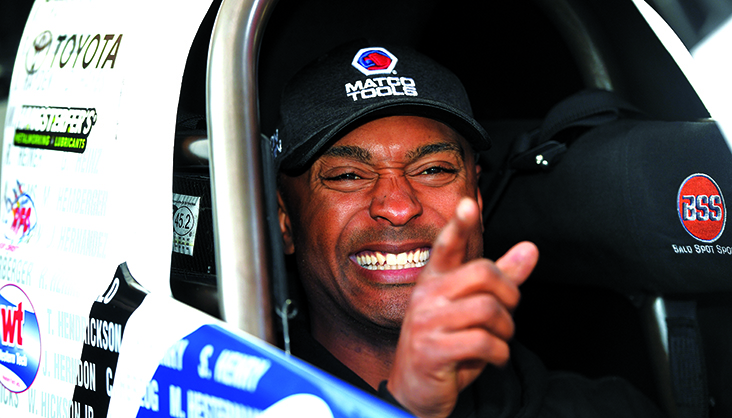
“His belief system was incredible. We had just won the first race of the Western Swing in Denver [in 2009], and he told us, ‘You’re going to win the Western Swing. What kind of gift would you like when you win it?’ I said, ‘Mike, I really like your watch,’ and by the time we got to Sonoma — which back then was the last race of the Swing — he had bought everyone on the team high-dollar Oakley watches; he probably spent like $40 grand and had them sitting there for the whole team. We were like, ‘Mike, we’ve still got to win this race.’ But we won the race, and he just said, ‘What did I tell you?’
“When you have someone who believes in you like that, you start believing what he’s saying. When you start believing it, you make it a reality.
“We have to believe in what we’re doing and not second-guess ourselves. When you do that, you become that unstoppable force. That’s when I started believing, ‘Hey, NHRA Drag Racing is made for us. I do belong here. This isn’t a dream. This is what it’s meant to be.’ And that’s when we went on that run for years.”
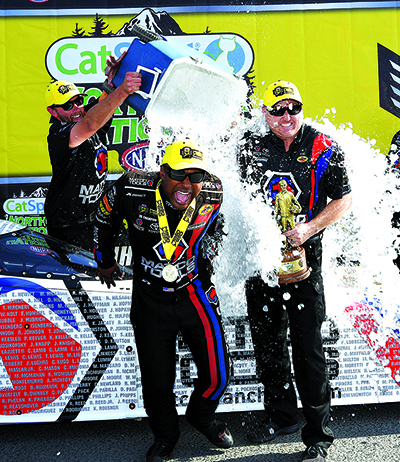
Brown’s success in Top Fuel over the last decade has been almost otherworldly, but then the wheels came off last season during a turbulent year of adjusting to the departure of Corradi and a cylinder-head issue that went undiagnosed for almost half the season. They won just once, in Seattle, after having not won since the previous year’s Seattle event.
“When we lost Brian, Brad [Mason] had to move up to fill that spot, and Mark suddenly has all of these responsibilities of overseeing the crew on top of tuning the car. The guy who did our cylinder heads became the car chief, doing what Brad was doing, overlooking the car. We were training people in new positions.
“We had a cylinder-head issue that was causing us to blow engines in the dragsters and Funny Cars. It was causing the valves to not sit right and get stuck in the port. So, not only were we trying to get some synergy with guys in different positions, but we were fighting gremlins and parts issues that we’d never faced before. We were up and down and all around, but we held our poise and grew from it.
“The biggest thing was that we always got stronger from the downs. Our car runs as good as anyone elses from 330 [feet] to the end of the track; once we get that 330 number to where we want it, it’s going to be a game changer. The other teams are going to be in trouble. Now, we’re starting to see that we’re getting back to the realm where we used to be.”
If Brown was feeling the stress of fallow seasons, you couldn’t see it in public, as he remained the constant cheerleader for his team, his guys, and his sponsors. It’s just an innate part of who he is.
“I always just had the knack to be a leader,” he said modestly. “I was always at the forefront of everything I did. I was the captain of the basketball team, the football team, the track team. I never put myself there; the coaches always put me there to be the one to show the way. They always told me that I led by example, by the work I put in and the way I carried myself, and that was how I could lead. That really resonated with me, to get the most out of the people you work with is the key ingredient. That’s what I think I bring.”
It’s the same work ethic and can-do attitude that he’s instilling in his kids — daughter Arianna and sons Anson and Adler — as they begin their own racing careers in Jr. Dragsters.
“I think my own story lets them understand what we go through,” he said. “I want to teach them not to quit, but also they have to put the work into it to get something out of it.”
And beside him all the while, whether she was the girlfriend who lived states away, the supportive wife through his hard times, or the mother of their children, is Billie Jo, who he wed in February 2001. Brown’s admiration and respect and love for his bride show no bounds.
“She’s been with me through thick and thin, she’s been a trouper,” he said with sense of deep admiration. “There were times when it was tough, but she stood the test of time, raising the kids while I was out on the road, but we got through it by sticking together.”
That’s Antron Brown is a nutshell. He’s a team guy. And damned good at it.



